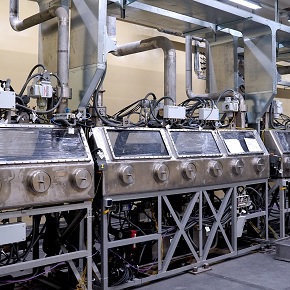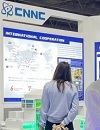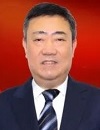USA
Theoretical ban on the sale of uranium in the United States will not cause problems for Russia - Likhachev
415 nuclear units are operating in the world, 56 units are under construction
Total production of uranium concentrate in the USA amounted to 10.4 tons of uranium in the third quarter of 2023
The reactor vessel has been dismantled at GE Vallecitos unit
423 nuclear units are operating in the world, 56 units are under construction
Power outages persist in North Carolina after armed attacks on substations
Fuel loading on the Vogtle-3 is scheduled for October 2022
440 nuclear units are operating in the world, 53 units are under construction
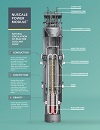 NuScale - waste controversy
NuScale - waste controversy
This time, a group of authors acted as critics, among whom stands out Allison M. Macfarlane, who headed the US Nuclear Regulatory Commission (NRC) for two and a half years.
In a journal called Proceedings of the National Academy of Sciences they published an article analyzing the amount of nuclear waste that will be generated in small modular reactors.
It is worth noting that in the United States, this concept includes not only radioactive waste, but also spent nuclear fuel, because in this country today it is not supposed to close the nuclear fuel cycle.
Small modular reactors (SMRs; i.e., nuclear reactors that produce <300 MWelec each) have garnered attention...
Owner of Susquehanna NPP has announced the commencement of a bankruptcy procedure
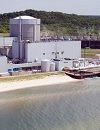 Palisades Nuclear Power Plant - last attempt
Palisades Nuclear Power Plant - last attempt
The authorities of the state of Michigan (USA) are looking for ways to avoid the closure of the Palisades nuclear power plant in the hope of saving hundreds of jobs.
The Palisades NPP consists of a single unit with a PWR reactor with a net capacity of 805 MWe. The plant has been in commercial operation since December 1971. The Entergy, the owner of the plant, previously announced that on May 31, 2022 the plant will be permanently shut down.
It became theoretically possible to avoid closure after the adoption by the US Department of Energy of the Civil Nuclear Credit Program in the amount of 6 billion USD.
The program allows the owners of nuclear power plants in difficult economic conditions to apply for financing, which...
Westinghouse to acquire BHI Energy
There are questions about the plans for the vitrification of radwastes in Hanford
NRC plans to issue at least six operating licenses for advanced reactors by 2027
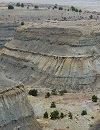 USA - uranium and list
USA - uranium and list
The U.S. Geological Survey (USGS) proposed at the end of February 2022 to exclude natural uranium from the federal list of critical minerals.
Critical minerals, or minerals that are critical to the US economy and national security, are determined based on a list of criteria that include physical scarcity, supply chain security, import dependency, and a range of other criteria.
The list of critical minerals is published by the US Department of the Interior.
The USGS has proposed delisting uranium, citing a legal requirement that fuel minerals cannot be listed. If the proposal is accepted, it will be a serious defeat for the American uranium mining sector, which is already going...
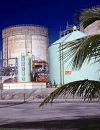 NRC withdraws 80-year extensions for four units
NRC withdraws 80-year extensions for four units
The US Nuclear Regulatory Commission (NRC) has withdrawn its early decisions to extend operating licenses to 80 years for units No. 3/4 of Turkey Point NPP and No. 2/3 of Peach Bottom NPP.
News of the regulators decision was published in the media, including reports from the Associated Press. The NRC website continues to state that the 80-year extension applications for these four units have been approved.
The withdrawal of extensions for the four units is associated with changes in the regulatory framework regarding the approval of the EIA. It is assumed that there will be no need to submit new applications, and approval of the updated version of the EIA will be sufficient for the re-entry of extension decisions into force.
Four Westinghouse LTA to be loaded at Vogtle-2 in 2023
443 nuclear units are operating in the world, 52 units are under construction
Nuclear News Ticker - February 14, 2021
Nuclear News Ticker - January 11, 2021
Nuclear News Ticker - November 27, 2020
442 nuclear units are operating in the world, 53 units are under construction
Three operators can manage plants with 12 NuScale reactors
441 nuclear unit is operating in the world, 53 units are under construction
449 nuclear units are operating in the world
451 nuclear unit is operating in the world
Brazil and USA could cooperate for small reactors - minister
454 nuclear units are operating in the world
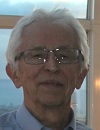 Siegfried Hecker: we are doomed to cooperate
Siegfried Hecker: we are doomed to cooperate
When I look at the past, I have always thought that cooperation was extremely important.My feeling is that we did a lot of good; there were a lot of benefits to both countries. It’s often not appreciated that it was actually beneficial to both countries. Itis unfortunate that it came pretty much to an end between U.S. and Russia.
And I also believe very strongly that we are not finished. There are still certain issuesin the nuclear arena that are of common interest. The way that I look at it, we have to cooperate to get the best from nuclear technologies. That would mean nuclear energy, future of nuclear power, and nuclear medicine, all of those things where nuclear does a lot of good, and we’re not done.
The other is how to prevent the bad things from happening in the nuclear arena. That means the issue of nuclear materials security and safeguarding.
Dallas company intends to apply for the licensing of the first in the U.S. interim centralized storage of spent fuel
Start-up of new nuclear units of Vogtle NPP shifted by 18 months
NRC completed the publication of SER volumes SER for Yucca Mountain
Negotiations on the fate of the Ginna nuclear power plant can not succeed
Fuel from Vermont Yankee unloaded to the pool
New American submarine will be named after admiral Rickover
The consequences of the closure of three nuclear power plants in Illinois will be ambiguous - report
Westinghouse will deliver CE16NGF fuel on Palo Verde
Vermont Yankee is finally stopped
Vermont Yankee closure will negatively affect the economy of the region
Estimate of Vermont Yankee decommissioning has not changed
NRC published the fourth SER volume for Yucca Mountain
Stephen G. Burns will lead the NRC from January 2015
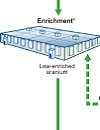 LEU for U.S. tritium: rethinking agreements
LEU for U.S. tritium: rethinking agreements
The threat of the LEU shortages for tritium production could push the United States not to revise but to rethink international agreements involving the United States, which are imposing restrictions on the use of enriched uranium produced using imported technology.
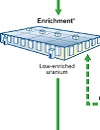 LEU for U.S. tritium: DoE plans
LEU for U.S. tritium: DoE plans
In the near to medium term, the Department of Energy sees three sources of obtaining the LEU for the tritium producing. In fact, they are all somehow tied to stocks.
The TVA company TVA, the tritium producer, has a valid contract with USEC (its new name is Centrus), under which the latter undertook to supply the LEU for these purposes until mid-2015 financial year. It is obvious that supplies under this contract are provided now from the USEC inventory.
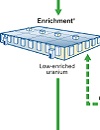 LEU for U.S. tritium: enrichment plants in the USA
LEU for U.S. tritium: enrichment plants in the USA
Thus, none of the enrichment plants operating or planned for construction in the United States will be able to produce the non-obligated LEU. This conclusion is valid for the case if the DoE will not be making efforts to bring to commercial application the American Centrifuge program.
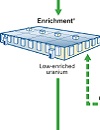 LEU for U.S. tritium: HEU and LEU for military
LEU for U.S. tritium: HEU and LEU for military
USEC is the only company to enrich uranium using US technology. In May 2013 the company ceased work on the last commercial enrichment plant Paducah. Company's financial position has deteriorated significantly. In March 2014 it was accepted the conditions of chapter 11 of the United States Bankruptcy Code, providing for the reorganization of the company.
Difficulties arising for USEC questioned the fate of the American program of creation of centrifuges for commercial use - American Centrifuge. This was the program for which the company spent a total of 2.5 billion dollars. In April, the Department of Energy transfers temporarily the control of the project to the Oak Ridge National Laboratory (ORNL). The ultimate fate of the project has not yet been determined.
Iran, US not to lose chance for a nuclear deal - former senator
NRC considers MOX factory construction license extension
NRC Chairman Allison M. Macfarlane announces decision to leave NRC
Iran, P5+1 Still Have Enough Time to Reach Agreement: US Department of State
US Aggressive Policy Toward Russia Could Trigger Nuke War: Nuclear Disarmament Advocate
US House Members Express Concern for Iran Refusal to Cooperate with Nuclear Inspectors
Pyongyang Says N Korean Nuclear Issue to Be Resolved by Termination of US Hostile Policy
Lavrov: Russia Hopes US Will Not Go Outside Scope Of Strategic Arms Reduction Treaty
Kerry: US to Press for Nuclear-Test-Ban Treaty Ratification
US Official: Preserving Arms Control Cooperation With Russia Becomes More Difficult
Ashton Spokesman: Current P5+1, Tehran Nuclear Talks Could Be Key to Reach Agreement
US, Russia Can Cooperate on Number of Issues Despite Differences on Ukraine: White House
Diplomat: Russia, US May Continue INF Treaty Talks, But Format Not Agreed Yet
Diplomat: Russia Sees No Reason to Discuss Illegal US Sanctions
North Korea Holds Trial of Detained American Citizen: Reports
Russia Already Capable of Mirroring US Prompt Global Strike
NATO Lost in Contradictions
US Delegation to Meet With Iranian Officials in Geneva to Discuss Tehran Nuclear Issue
Rouhani Slams New US Sanctions Against Iran as Illegal
Russia, US to Continue Talks on INF Treaty - Pentagon
Asteroid Defense - Casualty in Chilled US-Russia Relations - Expert
China Under Less Pressure from US due to Ukraine Crisis – Expert
Moscow Dismisses INF Treaty Violation Allegations as Part of US Anti-Russian Propaganda
Japan, US Planning Unmanned Submarine - Reports
US, Iran Representatives to Hold Nuclear Talks in Geneva - Report
US Tried to Subvert Signing of Major Russian-Iranian Oil Deal – Reports
US Deems Russian Drills Provocative Despite Location
UK, US to Carry Out Observation Flight Over Russia
Toxins in Lake Algae Leave Ohio Without Drinking Water
Moscow Calls US Report on International Arms Control Total Disinformation
NASA Experts, Russia Sign Radiation Safety Protocol Despite Sanctions
Russia Foreign Ministry Denies US Accusations of Violating INF Treaty
US Pushing for Tehran Missile Program in Multilateral Nuclear Deal
US Releases Report Accusing Russia of Violating INF Treaty
White House Accuses Russia of Violating Nuclear Weapons Pact
Allegation of INF Treaty Violation Part of US Anti-Russia Campaign - military expert
Construction of Brand New US Nuclear Plants Hampered
Washington Says Moscow Violated INF Treaty
Germany Not to Risk Relationship with US Over NSA Spying - Publicist
No Prospects of Russia-US Second Reset in View - Russian Diplomat
Argentina Sends Negotiators to US Days Ahead of Looming Default
US Shipping More Leftover Coal Abroad Amid Climate Change Fears
Boeing Becomes First US Company to Strike Deal with Iran Since 1979 – Reports
US Military Inspectors to Fly Over Russian Territory
US to Allow Iran Access $2.8 Bln Of Frozen Assets During Extension Period Of Nuclear Talks
Obama Wants to Improve Intelligence Cooperation With Germany After Spy Scandal
US, China Presidents Discuss Negotiations on Iranian Nuclear Program
US Memo Justifying Drone Use Against Civilians Disgraces America Own Values
US, Iran and Iraq Discuss Possible Cooperation in Vienna
US Congress Influenced by Lobby, Opposes Any Deal with Iran
US Steps Up Military Presence in Europe with Stealth Bombers – Report
US Deploys Three B-52 Bombers to UK for Drills
California Companies Hide Fracking Wells, Ignore Law – Reports
US Mulls Missile Defense System in South Korea – Report
Fracking Patents Rose 28% Last Year Worldwide – Report
Moscow to Respond if US Speeds Up European Missile Defense – Foreign Ministry
US Hindering Agreement on Iranian Nuclear Program
US-China Cybertheft Accusations to Have No Real Consequences
China Condemns US for Hypocrisy, Double Standards On Cyber Espionage Issue
US Policy Toward Iran Remains Unchanged, Tied to Israel, Saudi Arabia
US Concerned by Lack of Progress at Iran Nuclear Talks
Russian Deputy FM Says Washington Cutting Bilateral Ties with Moscow Over Ukraine
Shale Gas Fracking to Increase Overall Energy Use – Study
Heightened US Rhetoric on Ukraine Could Lead to New Cold War – US Congressman
Pyongyang Urges Washington to Stop Military Drills
Russian Nuclear Inspectors Tour Demolished US Launch Facilities
Russian Scientists Hand Over Synchrotron to US Lab Despite Sanctions
US to Curtail Cooperation with Russia Under Disarmament Agreement
Russia, US Complete Warheads-for-Fuel Program
US Energy Department Halts Cooperation with Russia on Peaceful Nuclear Projects
US Pullout on Missile Defense Talks Won’t Impact Russia
Pentagon Suspends Missile Shield Talks with Russia over Ukraine
US, German Military Inspectors to Fly Over Russia, Belarus
Russia Mulls Banning US Nuclear Arms Inspections – Source
US Ambassador Leaves Russia After Mixed Stint
Obama, Putin Hold Constructive Call on Ukraine Crisis
Russia Slams New US Sanctions Against Iran
Obama Says No Icy Relations with ‘Tough Guy’ Putin
US Official to Visit Russia to Discuss Defense Issues
US Alleges Russian Missile Treaty Violation – Report
Russian Bank Fined $9.5M by US for Violating Iran Sanctions
US to Spend $1 Trillion on Nukes, but Payoff Unclear – Study
Russian Diplomat Laments Stagnation in Ties With US
Moscow Sees No Pause in US Relations, Ready to Receive Obama
Russia Plans Rail-Mounted Missiles to Counter US Global Strike Program
New US Sanctions on Iran Threaten Nuclear Deal, Russia Warns
Russia Says Iran Deal Makes US Missile Shield Plan Redundant
Director General of ROSATOM S. Kirienko had talks with U.S. Secretary of Energy E. Moniz
Russia Warns of Nuclear Response to US Global Strike Program
US-Russian Warheads-for-Fuel Program Completed
Putin Again Slams US Missile Defense Plans
US Knew Russia Violated Nuclear Treaty – Report
Congress Plans Tough Iran Sanctions if Deal Fails
Most Americans Back Iran Nuclear Deal – Poll
US Keeping Most Sanctions Against Iran – Official
Russian, US Top Diplomats Discuss Syria, Iran - Moscow
Obama Urges No New Iran Sanctions
US Plan for Iran Nuclear Program Blocked After Hasty Changes – Russia
First Chapter of US-Russian Megatons-to-Megawatts Deal Closes
Kerry Opposes Draft Plan on Iran in Geneva – Source
Kerry: No Nuclear Deal Yet with Iran
US Modernizing Key Nuclear Bomb Amid Funding Concerns
Russian Military Inspectors to Fly Over United States
US Nuclear Officers Napped with Blast Door Open
Moscow Needs More Predictability in NATO Missile Defense Plans
Russia, US Stand Closer on Key World Issues - Ambassador
US Itching to Join Russia in Anti-Asteroid Nuclear Defense – Report
Iranian, US Diplomats to Meet on Sidelines of Nuclear Talks
US, Swedish Military Inspectors to Overfly Russia, Belarus
US Fires General in Charge of Nuclear Missiles
Russian Warheads Fuel Half of US Nuclear Power – Official
US Cold War Physicist Dies at 92
US Scientists Notch Nuclear Fusion Milestone – Report
US-Iran Soccer Game Ideal for Diplomacy – US State Dept.
Russians Divided on New Cold War with US – Poll
Slow START: US Increases Deployed Nuclear Forces – Scientists
Cold War Physicist Behind US Aerial Spy System Dies
Obama, Kerry Push and Pull in Rocky Year with Russia
Russia, US Neck and Neck in Hypersonic Research – Rogozin
Obama, Iranian Leader in Historic Talk – Nuclear Issue Discussed
Plutonium Shortage Threatens NASA Deep Space Program – Reports
Iranian Leader Declines Obama Meeting – US Official
Obama Open to Talks with Iran’s President – White House
US, Russia Sign Nuclear Energy Agreement
Diplomacy on Syrian Crisis Offers Lesson for Iran Talks – Obama
Putin Uses NYT Op-Ed to Warn US Against Syria Strike
Russian Parliament Urges US to Drop Syria Attack Plans
US, Seoul Map Out N. Korea Nuclear Deterrence Plan – Report
US, Russia Need New Reset – Putin Spokesman
US Senators Backing Syria Strike Got More Defense Cash Than Skeptics – Report
US Wary in Courting Russian Support for Syria Strike – Experts
US Senate Committee OKs Military Force Against Syria
Russia Begins Open Skies Flights Over US
White House-Kremlin Cold War Hotline Turns 50
Iran Slams US Uranium Scenario as Bid to Scuttle P5+1 Talks
Russia Inspects US Missile Defense Base in California – Report
Iconic B-52 Bomber Gets High-Tech Upgrade
US, Russian Officials Discuss Missile Defense
S.Korea, US to Start Joint War Drills
Chelyabinsk Meteorite Plume Lingered for Months – NASA
US Nuclear Reactors Vulnerable to Terrorist Threat – Report
Nuke Deals to Proceed Despite US-Russian Spat – Paper
US, Russia to Discuss Obstacles in Relations
US, Norwegian Military Inspectors to Fly Over Russia
Russia Begins Inspection Flights Over United States
US Opens Top Secret Cold War Nuclear Site for Tour
US Reporter Ordered to Testify on CIA Iran Leak Source
US Missile-Killer Fails to Hit Test Target
Cold-War Nuke Tests Latest Weapon to Fight Poaching – US Study
US Officials Say Russia Violating Missile Treaty – Report
Russian-US Warheads-for-Fuel Program to End in 2013
Retired US Gen. Suspected of Leaking State Secrets - Report
US-Russia Bombs-to-Fuel Program 95% Complete - NNSA
Obama Extends National Emergency on Russian Nuke Material
Moscow Links More Nuclear Cuts to Missile Defense - Minister
Obama Nuclear Arms Pitch More About Legacy Than Russia – Analysts
Russia Skeptical Over Obama New Nuclear Reduction Proposal
Obama Urges Further US-Russian Nuclear Cuts
Missile Defense Dispute Requires More Transparency – Putin
US Lawmakers Put Brakes on Russia START Nuclear Pact
Putin, Obama Optimistic About Future of Iran Nuclear Talks
Iran Says Could Talk With US If Nuclear Right Recognized
US to Discuss North Korea High-Level Talks Offer
N. Korea Proposes High-Level Talks With Washington
US Lawmaker Seeks Pentagon Checks on Russia Energy, Military
US Chemical Weapons Report in Syria Fabricated – Russian MP
Missile Defense Key to Developing US-Russian Ties – MP
Russia No Security Rival to Washington – US Ambassador
US, Russia Urge Iran to Cooperate With IAEA
US Teen Builds Nuclear Fusion Reactor in Dad Garage
Cold War Missile Silo for Sale in NY: 1 Bedroom, 1 Bath, 2 Blast Doors
EU Slams Bulgaria Minister Plan to Reinstate Communist Agents
North Korea Condemns US Ballistic Missile Test – Report
Missiles but No Meteorites on US-Russian Agenda – Official
Putin, Obama to Meet in June, September - Kremlin
Missile Defense Obstructs Nuclear Forces Cuts - General
US Lawmakers Try to Block Sharing Missile Defense Data with Russia
US Ready to Rumble with Iran, Russia
US Missile Defense Plan Changes Linked to Economic Issues
CIA Spy Row Won’t Affect Russia-US Ties - Senator
Russian Security Council Chief Upbeat Ahead of US Visit
US, S.Korea Launch Naval Drills in Yellow Sea
Aliens Messed with US, Soviet Nukes – US Airmen
Ukraine Thanks Russia, US for Chernobyl Aid
S.Korean PM Against Redeploying US Tactical Nuclear Weapons
Kerry Tells NATO to Prepare for Syrian Chemical Weapons
Nuclear Weapon Use Suicidal for N.Korea - Colin Powell
Cold War Military Complex for Sale in NY
Moscow Says It Is Ready to Pick Up Positive Signals from US
North Korea Missile Launch Would be ‘Provocation’ – US
Obama Calls for More Nuclear Weapons Funding, Cuts for Nonproliferation
US Can Intercept N. Korean Missile — Top Commander
Putin Warns Korean Crisis Could Be Worse Than Chernobyl
Moscow Hails US Decision to Delay Missile Test
US, Russia Remove Nuclear Material From Czech Republic
Bellicose N. Korea Forcing US Hand – State Dept.
Putin, Obama to Meet in June - Kremlin
N.Korea Missile Deployment Not Aimed at US - Seoul
N. Korea Approves Nuclear Strike on US - Report
US Needs 5-7 GBIs to Intercept One Topol ICBM - Expert
Nuclear-Capable US Bombers Fly Over S. Korea
Joint Russia-NATO Missile Shield Inefficient - Rasmussen
North Korea Targets US Mainland
US, Russian Defense Chiefs Agree to Resume Missile Defense Talks
Shoigu Urges Pentagon to Revive Missile Defense Dialogue
Moscow to Study New US Missile Defense Proposals
Ukraine to Continue Nuclear Cooperation with US – Yanukovych
Moscow to Discuss Changes in US Missile Defense Plans
US Military Launches New Missile Defense Satellite
Moscow Needs Explanations on US Missile Shield Changes
Moscow Unimpressed by Changes in US Missile Defense Plans
US Missile Defense Shift No Way About Russia
US Shipyard Worker Sentenced for Nuclear Sub Fire
US to Strengthen Missile Defense Against N. Korea
South Korea, US Start Huge Military Exercises
Washington Says N. Korean Threats Regrettable
Russia, US In For Serious Missile Defense Talks - Ambassador
White House: Fully Capable to Defend Against North Korea Nuclear Threat
Russia Invites US Military Chief to Missile Defense Talks
Nuclear Waste Leaking in Washington State
Medvedev Paints Gloomy Picture of US Missile Defense Dispute
US Sees Russian Cyberthreat as China Grabs Headlines
Lavrov, Kerry Talk Syria Settlement, North Korea Test
Obama Makes Economic Push in State of the Union Speech
N. Korea Informed US of Nuclear Test Plans: State Dept.
US Expects No Breakthroughs during Gottemoeller Moscow Visit
Options Open for Obama to Slash Nukes
Lavrov Calls Magnitsky Act Demonstrative Anti-Russian Move
US Senator McCain Likens Iran Leader to Monkey
US Arms Official Plans Moscow Talks
No Plans for Obama to Visit Russia Before G20 Summit
Clinton Urges Russia to be More Integrated
No flexibility in US Missile Talks - Medvedev
Kerry Confident US-Russia Ties Can Be Improved
White House Calls N.Korean Threats Needlessly Provocative
TENAM and Fuelco Conclude the First Contract for Supply of Russian Enriched Uranium to a U.S. Generating Company
US Navy Sub in Persian Gulf Collision
Iran Condemns US Nuclear Test
US Denies Tehran Claims of Drone Capture
Iran Claims US Drone Capture
Obama Hails Disarmament Pact With Russia
Use of Force by US Cannot Solve Problems - Russia
US Critisizes N.Korean Launch Plan
US Senate Votes For New Sanctions on Iran
Iran: No Talks with US
Ahmadinejad Wants Direct Talks with US on Iran Nuclear Issue
Full Devastation of Storm Felt Along US East Coast
US to Include S.Korea in its Global Missile Shield - Panetta
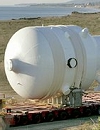 San Onofre Infantile Disorder
San Onofre Infantile Disorder
But the struggle of trade unions may not lead to anything, and the revival of the American nuclear imdustry is not moved an inch. Not surprisingly, the owners of San Onofre NPP had to apply for the new steam generators abroad, namely in the Japanese corporation Mitshubishi Heavy Industries (MHI).
From the Japanese plant workers it was requested to produce and deliver new steam generators capable to work reliably at least 20 years or more. Terms of the license for San Onofre NPP units completed in 2012-2013 to achieve 40 years of service. But the owners of the station planned to extend to 20 years, and then, perhaps, another 20.
MHI was actively took up the order. But at first there were warning signs. During the inspection two SGs for third unit in spring 2010, it was revealed the cracks in the welds. The cracks in operating conditions will inevitably become a hotbed of corrosion damage. Results of the inspection were the subject of heated discussions with customers and regulators.
White House Denies Media Reports on US-Iran Bilateral Talks
Russia Quits Nunn-Lugar Program
Moscow Warns over Use of Force Against Iran
N. Korea Says US Mainland Within Its Strike Range
Obama Tells UN: Time Ticking for Iran
Obama Warns Iran over Nuclear Ambitions
U.S.-Russia Commission Discusses New START Implementation
Washington Fully Declassifies Cold War Nuclear Plan
Moscow Rejects U.S. Claims of Arms Control Breaches
Russia Calls on U.S. to Ratify Nuclear Test Ban Treaty
U.S. Hails Russia Readiness for Nuclear Cuts
Curiosity Laser Targets Martian Rocks
U.S. Iran Sanctions Threaten Ties With Russia – Official
U.S. Congress Passes New Sanctions Against Iran
US Increases Sanctions on Iran
Ñhavez Slams Clinton for Threatening Russia
Russian Army Chief Starts Visit to the United States
Putin Pessimistic on Missile Defense Problem
Obama Extends National Emergency Over Russian Nuke Material
Russia, U.S. Want Serious Efforts from Iran to Restore Trust
Putin, Obama Call on N. Korea to Meet Six-Party Commitments
Putin, Obama Agree to Continue Dialogue on Missile Defense
U.S. Plans New Iran Sanctions if Moscow Talks Fail
U.S. Approves New Iran Sanctions
U.S. Held 5 Inspections of Russia’s Strategic Missile Forces - SMF Commander
Iran Activity Inconsistent with Peaceful Program
Russian, U.S. Presidents to Continue Reset
U.S. Vows to Go Ahead with Missile Shield, Hopes for Russia Cooperation
Obama, Putin Agree to Continue Reset - White House
Putin Pushes For Guarantees on U.S. Missile shield
Washington May Let Tehran Enrich Uranium
N.Korea Wastes Millions on Rockets while People Starve - Obama
White House Blasts N.Korea Rocket Launch
U.S. Missile Defense in Gulf Signals Strike on Iran – Russian Lawmaker
Nuclear-Armed Iran Unacceptable – Pentagon
Obama Speaks for World without Nuclear Weapons
Medvedev, Obama to Discuss Missile Shield, Syria in Seoul
U.S. Denies Disclosing Missile Defense Data to Russia
U.S. Obama to Visit North Korean Demilitarized Zone
Washington Welcomes N. Korea Invitation of Nuclear Experts
April Talks Last Chance for Iran to Avoid U.S. Attack - Hillary Clinton
U.S. May Disclose Missile Defense Data to Russia
U.S. May Attack Iran with New ‘Great Weapon’ – Pentagon Official
U.S. Beefs Up Defenses in Strait of Hormuz - Paper
Only 2% of Americans Consider Russia Greatest Enemy
Kyrgyz Base Will Not be Used Against Iran - U.S. Ambassador
U.S. Mulls Steep Nuclear Arsenal Cuts
U.S. Mulls Steep Nuclear Arsenal Cuts
Obama Sees no Grounds for Iran Attack on U.S.
Washington Favors Economic Pressure on Iran – State Dept.
Obama Vows to Stop Iran Nuclear Program by All Means
Russia, U.S. to Dispose of 34 Tons of Weapon-Grade Plutonium
More U.S. Sanctions Against Iran to Follow - Obama
U.S. says will give no missile defense assurances to Russia
Iran leader blames CIA, Mossad for scientist murder
U.S. condemns Iran decision to start uranium enrichment
Iran reports arrests of U.S. spies
United States dismisses Iran’s belligerent statements
U.S. presidential candidate threatens to bomb Iranian nuclear sites
START may be sunk by a nuclear torpedo
U.S. preparing for tactical nuclear cuts in future arms deal with Russia
Russia, U.S. ink uranium enrichment pact for 2013-2022
U.S., Russia share interest for peace and stability on Korean peninsula
Clinton to discuss N.Korea situation with counterparts
U.S. conducts 12 START inspections in Russia in 2011
Iran threatens to target NATO missile shield in Turkey
NATO, U.S. set to continue to work with Russia on missile defense
Russia to move missiles to EU borders if U.S. shield talks fail - Medvedev
U.S. Cisco to open network innovation center at Skolkovo hi-tech hub
Russia ready to dialogue with U.S. on missile defense-Foreign Minister
Washington denies seeking military confrontation with Iran
U.S. has nuclear superiority over Russia
US, North Korea start nuclear talks in Geneva
U.S. presses UN nuclear watchdog inspectors on Iran nuclear data - paper
Ukraine, U.S. to sign memorandum on high enriched uranium on Sep. 26
U.S., Romania set to sign missile shield agreement
U.S. could threaten Russian strategic nuclear forces - Foreign Minister Lavrov
Two U.S. nuclear reactors shut down by quake
Belarus calls off joint nuclear fuel swap programs with USA
Russian-U.S. $110 mln uranium fraud case goes to court
U.S. missile shield may be precursor for Iran attack - Rogozin
Russia, U.S. to hold nuclear security drills in August
Russia says European missiles talks not deadlocked
Leaving politics out of it: Military implications of missile-defense
Iranian leader accuses U.S. of plotting to destabilize Pakistan nuclear facilities
Nuclear threat still high despite weapons cuts, report says
Medvedev approves Russian-U.S. plutonium disposal deal
Obama invites Russia to participate in missile defense plans in Europe
Russia, U.S. unlikely to agree on missile defense by end of Obama tenure - U.S. envoy
Medvedev says Russia, U.S. losing time on missile defense
Russia, U.S. fail to agree on missile defense guarantees
Medvedev, Obama discuss missile defense, visas, terrorism at G8 summit
U.S. lifts market restrictions against Rosatom
Russia, U.S. may agree on European missile shield by 2020 - Medvedev
Russia, U.S. should have separate anti-missile systems, Poland says
Russia on U.S. missile plan: No Poland deployment
Moscow and Washington must close the door into the past
Russia may take action over U.S. missile shield
U.S. administration optimistic about nuclear test ban treaty ratification
United States unfolding missile defense in Europe de facto - Rogozin
Russia may counter U.S.-Romanian missile shield deal - lawmaker
Moscow pushes for guarantee U.S. missile shield not targeting Russia
Moscow keeps tactical nuclear weapons cuts issue low-key - Russian senator
Russia, U.S. to discuss nuke-powered spaceship project
Russian, U.S. experts to conduct joint stress tests at nuclear plants - Rosatom chief
Russia, U.S. in talks on uranium enrichment joint venture
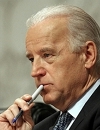 Uncertain World: Vice President Biden reconnaissance visit to Moscow
Uncertain World: Vice President Biden reconnaissance visit to Moscow
Vice President Joe Biden, the second most senior U.S. politician, and a man deeply involved in the Russia policy, is in Moscow on a two day visit.
Biden is the man who first coined the phrase push the reset button during the Munich security conference two years ago.
He also told the Wall Street Journal, in an interview in July 2009, that Russia economy is withering and that the trend would force the country to make accommodations to the West on a wide range of national security issues, including loosening its grip on former Soviet republics and shrinking its vast nuclear arsenal.
And lastly, it was Biden influence in Congress that ensured the New START Treaty was ratified in December 2010.
The reset program formulated in spring 2009 has been fulfilled and the partners now need a new agenda. Biden Moscow trip is the first step in this direction.
There are three sets of issues – strategic, regional and economic.
Obama extends national emergency regarding Iran
Medvedev, Biden to meet in Moscow
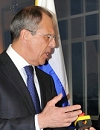 U.S.-Russian reset: a house built on sand
U.S.-Russian reset: a house built on sand
The second anniversary of the reset is upon us, and yet experts are still disputing the very meaning of the concept. There are two opposing camps among American studies experts in Russia.
One camp, with roots going back to the Soviet era, believes that the Democrats are more favorably disposed toward Russia than the Republicans because the Democrats are ostensibly more progressive and tolerant of other cultures, including our own. The other camp, made up of post-Soviet pragmatists, thinks that Russia is better off dealing with the Republicans, who are more overtly hostile to Russia. They do not have to prove their patriotism to anyone, and this is why it is easier to reach agreements with them. Think Richard Nixon.
Barack Obama decision to pursue a reset with Russia in 2009 seemed to support the argument of the first camp. Obama, however, was guided by purely pragmatic considerations, which we usually ascribe to his Republican opponents.
Obama has not fallen for Russia. He appears to have much less sympathy for our country than Bill Clinton.
Missile defense, Russia WTO membership top U.S.-Russian agenda in 2011
U.S. to expand civilian nuclear cooperation with Russia - official
Russian, U.S. generals to discuss nuclear terrorism in Lisbon
U.S. confirms $50 mln aid for Ukraine nuclear security program
United States to hold talks on tactical nuclear weapons with Russia
Russia says too early to talk tactical nuclear weapons with United States
Civilian nuclear breakthrough for U.S.-Russian reset project
Putin hails Medvedev over New START treaty
Russia upper house may ratify New START treaty on Jan. 26
Russian lawmakers split over New START ratification
President Medvedev welcomes START treaty ratification by U.S. Senate
Civilian nuclear deal enables U.S., Russia to develop nuclear reactors
Russia may boost nuclear cooperation with the United States
Russia, U.S. propose UN General Assembly resolution on arms cuts
U.S. confident in Russia over its nuclear cooperation with Venezuela
U.S. administration seeks soonest ratification of arms treaty with Russia
Ahmadinejad rejects information about secret talks with U.S.A.
U.S. announces completion of W62 warhead dismantlement
India, U.S. sign nuclear energy agreement - news agency
Russian missile cruiser arrives in San Francisco on friendly visit
TENEX and Dominion Nuclear declared a contract for supply of enriched uranium product
Obama hails nuclear non-proliferation accord
NPT review conference approves final declaration
US Agency Approves Nuclear Fuel Contract Between Russian Supplier And Minnesota Utility
Nuclear cooperation deal to bring Russian technologies to U.S.
Obama resubmits with Congress U.S.-Russia peaceful nuclear deal
Obama says U.S. could ratify new nuclear arms deal by November
NPT review conference starts in New York
Iranian Ahmadinejad applies for U.S. visa
U.S. skeptical about Iranian nuclear enrichment plans
Russia, U.S. call on other states to join nuclear disarmament
Tehran wants U.S. expelled from IAEA
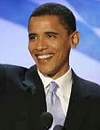 Obama nuclear summit: A minor success
Obama nuclear summit: A minor success
The international nuclear community seems to need something like a miracle to get serious about developing new standards to ensure compliance with international nuclear obligations. Further proof of this fact was provided by Barack Obama Nuclear Security Summit held in Washington on April 12-13.
Leaders from 37 countries and delegations from 10 other states have agreed to secure all vulnerable nuclear materials, such as uranium and plutonium, around the globe within four years to keep them out of the grasp of terrorists. This is certainly a success, if not a miracle.
However, this goal is unlikely to be achieved in four years. To make progress in this sphere, we must first solve the complex problems in the Middle East, India and Pakistan, Afghanistan, Iraq and several other countries. It is the failure to solve these problems that is increasing the threat of nuclear terrorism.
Until recently, only the United States and Russia were serious about securing vulnerable nuclear materials. After the Washington summit, other countries may join in this titanic undertaking.
North Korea sees U.S. trust as solution to nuclear issues
Russia, U.S. will each dispose of 34 metric tons of excess weapon-grade plutonium
U.S. nuclear security summit to focus on terrorist threat
New START treaty benefits both signatories - Russian analyst
Washington to unveil new U.S. nuclear doctrine soon - official
China could build up nuclear capability to counter U.S. missile shield
U.S. to pump money into nuke stockpile, increase security
North Korea's nuclear negotiator to visit U.S. in March
International community ready to help Iran get medical isotopes
France, U.S. to present proposals on Iran sanctions to UN
U.S. to increase spending on nuclear complex - Biden
Obama calls for comprehensive nuclear disarmament
Russia, U.S. to resume START talks February 1 - State Department
 Russian-American START treaty hinges on simultaneous ratification
Russian-American START treaty hinges on simultaneous ratification
Russia and the United States have agreed to resume talks on a new strategic arms reduction treaty. A U.S. delegation led by National Security Advisor General James Jones and the Chairman of the Joint Chiefs of Staff, Admiral Mike Mullen, is expected in Moscow soon.
U.S. President Barack Obama and his Russian counterpart, Dmitry Medvedev, agreed last year to reduce the nuclear warhead stockpile to between 1,500 and 1,675 for each country.
A higher level of the negotiators shows that the sides have made progress toward signing a new START treaty, which was at the top of their agenda last year. The new treaty is to replace the 1991 agreement, which expired on December 5, 2009.
Russia and the U.S. failed to finalize a new treaty late last year, but hope to sign it soon.
President Medvedev said commenting on the work to draft a new fundamental treaty on nuclear disarmament. The way it was done in Soviet times is unacceptable - when the Soviet Union ratified the documents and the U.S. did not. We must prepare a document that has been well thought out.
U.S. calls Iran Six meeting in New York useful
Iran Six gears up for meeting in New York
U.S., Russia officials talk arms cuts, Iran in Moscow
Unusual space object, possibly man-made, approaches Earth
Washington says its patience with Iran runs out by yearend
White House says Iran is running out of time to resolve nuclear standoff
Radiation leak investigated at U.S. nuclear power plant
China backs U.S. over Iranian nuclear issue
U.S. set to press Iran for nuclear transparency
U.S. delays nuclear summit until May
China welcomes future U.S.-N.Korea nuclear talks
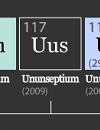 Ununseptium - the 117th element
Ununseptium - the 117th element
Physicists at the Joint Institute for Nuclear Research launched an experiment on synthesis of the 117th element in Mendeleev's periodic table.
The 113th, 114th, 115th, 116th and 118th chemical elements were first synthesized in the same institution.
All transuranium elements, starting from neptunium (93), where produced in three laboratories: in Berkley (U.S.), Dubna (USSR/Russia) and Darmstadt (Germany). USSR and USA competed in producing elements during the past century. Some elements were produced by Soviet and U.S. physicists simultaneously but separately from each other.
To synthesize ununseptium, another transuranium element, berkelium-249, is used. The experiment is carried out in a U-440 cyclotron. The synthesis process: moving at high velocity (1/10 of the speed of light), berkelium ions are ejected from a cyclotron and strike a target, where they are bombarded with calcium nuclei. Ununseptium nuclei can be discovered among the products of the reaction.
25 mg of berkelium-249 necessary for the experiment were provided by physicists from the U.S. Oak Ridge National Laboratory (ORNL).
Russia, U.S. to continue nuclear arms talks on November 9
 Steven Kirsch: I do not know anyone who has not come away impressed
Steven Kirsch: I do not know anyone who has not come away impressed
The IFR (Integral Fast Reactor) project was dead in Bill Clinton time but many people still believe in its resurrection. The scientists and engineers from the U.S. Argonne National Laboratory insist that their IFR/AFR concept will fully satisfy the criteria required for the 21st nuclear reactor. Recently they win one more supporter, Steven Kirsch.
Steven Kirsch, a multi-millionaire and businessman, is famous as the optical mouse inventor and patent owner. He is a philanthropist awarding by the U.S. National Caring Award and he was pretty agnostic about nuclear power. Now he changes his opinion after he learnt more about the IFR.
I do not know anyone with an open mind who has met with the scientists who worked on the project who has not come away impressed. Even the harshest critics of the IFR admit that that they might be wrong, Kirsch writes on his website. What are the reasons why the U.S. businessman is supporting the fast reactors? Can the Russians and Americans cooperate in the fast reactor programs?
Russia says new U.S. anti-missile scheme may not be implemented
U.S. considers IAEA draft deal on Iran as positive step - Kelly
 123 agreement and Russian nuclear industry
123 agreement and Russian nuclear industry
In the series of articles by the American authors that appeared in the Russian press, some new directions of the collaboration are mentioned, that could be initiated if the 123 agreement will come into effect.
First of all, it is the creation of the fast neutron reactors. It is very important, that in this direction Russia can play the role of a donor, and America, correspondingly be a receiver of the technologies.
Development of fast neutron reactors in USA was stopped during more than 20 years, and a main part of groundwork of American specialists was either lost or went out of date. Theoretically Russia could export to the United States its own technologies on commercial prices, but American politicians should overcome their own pride for that and take a principal decision on the possibility of buying the advanced technologies from the recent most probable enemy.
Less ambitious and faster realizable project could become the use on the commercial terms of the Russian experimental base - first of all possibilities of NIIAR - for the American program on creating of the fast burn-out reactor.
 Nuclear deal between India and USA has arisen from the dead
Nuclear deal between India and USA has arisen from the dead
India has made the first step to escape an international nuclear isolation. Government of this country has enlisted the support of the regional socialistic party Samajwadi in the parliament. Now there is no threat of the no-confidence vote to the cabinet of ministers, and government can begin realizing final steps of the nuclear deal with the USA.
Certainly, Amar Singh, Samajwadi general-secretary assures journalists that his party won't change its negative attitude to the nuclear deal until the government, or precisely prime-minister Manmohan Singh - won't give public answers to the questions of the left political parties.
Though, even if the declaration of the cabinet chief will follow, it won't have any juridical liabilities. According to the Indian constitution deputies don't have a right to ratify international agreements and the only thing that government was afraid of, was a possibility of the liable parliament coalition split. After the appearance of Samajwadi such a thread was definitely eliminated.
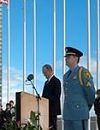 Conflict of nuclear initiatives
Conflict of nuclear initiatives
If the GNEP principles concern the technologies of fast reactors and closed fuel cycle, what does Joseph Adda, the Minister of Power Engineering of Ghana have to do with it being one of the GNEP signers? What is the purpose of persuading the delegations from Cameron, Tanzania and Tunis in the IAEA headquarters? How to explain the intention to involve Georgia into the GNEP if not by a desire to do Moscow an ill turn?
Will the situation be such that the respectable African states will demand their share of fast reactor technologies in the future? Washington doesn't think so. Thus, the discriminating principle of the GNEP is confirmed, the principle that states the old American dream: to create a certain superstructure that will duplicate and actually replace the IAEA and NPT, naturally on the basis suitable for the USA.
 USA and Rosatom have initialed a draft amendment to Suspension Agreement
USA and Rosatom have initialed a draft amendment to Suspension Agreement
The U.S. department of commerce and the Russian Federation's Federal Atomic Energy Agency (Rosatom) have initialed a draft amendment to the agreement suspending the antidumping investigation on uranium from the Russian Federation (Suspension Agreement).
The proposed amendment will allow Russia to export its uranium products to the U.S. market in accordance with the export limits and other terms detailed in the amendment. The U.S. financial department is now waiting for comments from all interested parties, which can be submitted within 30 days.
The suspension agreement was signed on October 30, 1992 on the basis of an agreement by Russian government to restrict the volume of direct or indirect uranium products exports to the United States.
Five truths and untruths of Kirienko-Bodman Statement
Is it true that signing of Kirienko - Bodman joint statement is the successful for Russian energy nuclear complex?
It isn't true. Using the only (after decommission of BN-600 reactor) fast reactor BN-800 for utilization of weapons-grade plutonium will make difficult to work on closing nuclear fuel cycle (NFC), in particular, to restrict the opportunities of Russia for recycling reactor plutonium (accumulated in reactor), that, in its turn, to postpone resolving a problem of nuclear waste and conversion to use of almost unlimited resource base of 238U.
Was there damage to Russian civil nuclear sector interests? If yes - how serious it was - it would be estimated only after removal of security classification from the results of technical consultations between Russian and American experts.
Closed or excess
Strictly speaking, Russian atom doesn't need in BN-800 reactor. Sodium technologies serviceability in Russia is proven by multiyear experience of BN-600 reactor operation, but BN-800 reactor can't go to commercial level. Implementation of BN-800 reactor into closed fuel cycle - mastering of technologies for reprocessing spent nuclear fuel (SNF) of VVER reactors, fabrication of new fuel from them, reprocessing of SNF of BN-800 itself and other - should be priority of number 1 for this reactor.
But it is impossible to solve this task with simultaneous using BN-800 for weapons-grade plutonium utilization. And if decision about political usage of BN-800 reactor is adopted ultimately, Russia will have a risk to freeze its current interim state for two-three decades - excellent, the best fast reactor technologies in the world and absolutely no closed NFC.
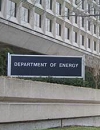 Vladimir Rychin: The case of SWUs
Vladimir Rychin: The case of SWUs
The day before the Day of Nuclear Industry Worker Rosatom received a small but nice present from United States Court of International Trade. American justice has confirmed as in the case with Eurodif that Russian contracts for uranium enrichment are services rather than goods and they can't be subject to USA's antidumping legislation.
There were only few who doubted in favorable decision from the Court concerning the case Techsnabexport against the United States. American system of judicial legislation didn't leave any hope to Russian opponents - US Department of Commerce, USEC corporation and local nuclear trade union. French SWUs don't differ from Russian ones, and uranium enrichment at Rosatom's enterprises doesn't differ from analogous work in France.
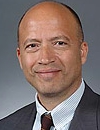 Hussein Khalil: I think you will be very strongly welcomed
Hussein Khalil: I think you will be very strongly welcomed
There are no final decisions because the U.S. Department of Energy is seeking the input from industrial teams around the world. Many different industrial teams are being asked to contribute their ideas. Now we know about the state of the technology; however, it is much more likely if this reactor will be built, say, in timeframe of 2020-2025 then we will need to use more established technology. In this case it has to be a sodium-cooled reactor.
Certainly, there is an interest for the longer term. For example, in the Generation-IV we consider the different reactor technologies as the lead-cooled reactor, because they offer some potential improvements. However the timeframe that envisioned for the GNEP encourages the using of proven technologies. This relates to the sodium reactor and probably also to the fuel type which would likely be either oxide or metallic fuel, with which we have the greatest experience.
U.S. lifts restrictions on Russian uranium supplies
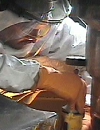 Corrosion of Alloy 600 - comment of our reader
Corrosion of Alloy 600 - comment of our reader
Corrosion of elements of Alloy 600 is known among Western nuclear specialists long ago, at least much earlier than incident at Davis-Besse NPP. The report of NRC issued in 2005 (NUREG-1823) states that the first similar incident was registered at the third unit of San Onofre NPP with PWR-1000 reactor in California. Here I&C nozzle at pressurizer is subject to corrosion. In 1987 nozzles of the same pressurizer leaked at unit with PWR reactor in Arkansas. In 1989 there was the first information of PWSCC corrosion at French units. Two years after the first incidents of corrosion damages of control rod nozzles on reactor vessel heads of Western pressurized water reactors were detected. Nowadays leakages of measuring detectors in reactor bottom and appearance of cracks in butt weld are observed. Firstly this problem arose in 1971 with leakages in steam generators. All these and other incidents are well documented and collected in the report NUREG-1823 above-mentioned or in another known document MRP-111 (Materials Reliability Program Resistance to Primary Water Stress Corrosion Cracking of Alloys 690, 52, and 152 in Pressurized Water Reactors).
Davis-Besse NPP - Mistake in DNA
After incident at Davis- Besse NPP, material 1600MA was removed urgently from the AP-1000 reactor project. American designers actually admitted by this fact - there was an internal critical mistake in PWR reactor technology. In other words - a mistake in reactor DNA. Here comparison with DNA is not accidental. Following USA, 1600 MA was implemented practically in all PWR projects - similar reactors in the world, except Russia. If unreliable material can be replaced in new light water reactors, unexpected catastrophe at operating NPPs can be prevented only by organizational measures such as careful and repeated inspections. About seriousness of mistake one can judge on panic behavior of AP-1000 designers. A replacement of 1600MA material is suggested in all elements of new unit of almost the third generation. First of all it proves that the designer is not sure in reliability of own project.
A Trap for Minatom. Uranium Zugzwang
When talking about energy security why does everybody think that Russia should provide energy security for the world? Everybody forgets that Russia also needs in providing energy security. It is impossible to achieve equal cooperation in the world without this consideration, Vladimir Putin, President of Russia believes. It is very difficulty to argue with these words of Russian leader and there is no need. May be Russia had to cancel HEU-LEU deal, reconciling with the threats of multibillion losses? One can find another application for LEU obtained from excesses of weapons-grade plutonium than troublesome selling of it to USA. If to formulate the question more correctly, could Russia use the threat of LEU-HEU agreement cancellation as one of arguments, which could convince Washington to reconsider its discriminating attitude towards Russian uranium, in particular, to cancel 116% duties for import uranium from Russia to USA?
Missile defense: to be or not to be?
Russia, U.S. to sign nuclear power cooperation deal in fall
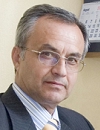 Vladimir Kagramanian: Breeding Ratio Should Be Cheap
Vladimir Kagramanian: Breeding Ratio Should Be Cheap
There is a simple logic here. There are two competitive processes in fast reactor - burning of plutonium loaded and accumulation of new plutonium from 238U. If fraction of loaded plutonium is 20%, its burning is compensated due to accumulation, and energy is generated due to using natural 238U, the reserves of which are "unlimited". But if the content of plutonium is higher than the above-indicated border - 40-50% and more, the rate of plutonium destruction will exceed the rate of its accumulation from uranium. This reactor will become the reactor - burner of plutonium technologically bred, the reserves of which are small, in several times less than the reserves of natural 235U. It means that reactor itself, coolant, the core and other components will be the same both in reactor-breeder and in reactor-burner, but the relationship between physics processes will be different. The tasks, which these reactors will solve, also will be different. Naturally, economy and safety of these reactors will be also different. For example, reactor-burner will have more complicated fuel cycle, and it will be necessary to compensate a drastic drop in reactivity during fuel cycle in this reactor core…
U.S. refusal to prolong START-1 fatal mistake - Russian experts
A decision not to renew a major nuclear arms reduction treaty may have dire consequences for U.S. foreign policy and the entire world, Russian experts said Thursday. The Strategic Arms Reduction Treaty (START-1) was signed by the United States and the Soviet Union on July 31, 1991, five months before the union collapsed, and remains in force between the U.S., Russia, and three other ex-Soviet states. Belarus, Kazakhstan and Ukraine have since disposed of all their nuclear weapons or transferred them to Russia, and the U.S. and Russia have reduced the number of delivery vehicles to 1,600, with no more than 6,000 warheads. The treaty is set to expire on December 5, 2009.
Russia and USA prepared intergovernmental agreement for cooperation in peaceful use of nuclear power
 A Trap for Minatom. Three Levels of One Deal.
A Trap for Minatom. Three Levels of One Deal.
Level #1, or level of international law, permits the Russian government to suspend, demand modification or even denounce the HEU-LEU agreement. However, this option is completely blocked at the lower levels. Some contracts (level #2) do not consider any right of Russian side for suspension or cancellation. Besides, any cessation of Russian uranium supply to the international consumers (level #3) will compromise the Russian Federation as a supplier on the world market.
 A Trap for Minatom. Per Aspera Ad Negotia
A Trap for Minatom. Per Aspera Ad Negotia
Then the political rescue rangers came, and many people believed in their frankness. In October 1992, the USA and Russia signed the agreement suspending the antidumping investigation on uranium from the Russian Federation - Suspension Agreement - for that uranium, which could be delivered in the United States in the frame of HEU-LEU contract. This rarely generous offer from Washington dissembled a dirty trick. The item M.2 of Article IV of Suspension Agreement forbade indirectly any import to the USA of the HEU feed component.
International Nuclear Fuel Bank: Taken Question

